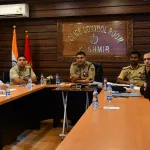At a time when our streets echo with prayers from masjids and temples, and the spiritual fervor of the Amarnath Yatra and Moharram fills the air, the establishment of liquor outlets across the Lal Chowk Assembly Constituency—particularly in Panthachowk, Athwajan, Batwara, and Indiranagar—represents not merely an ill-conceived policy decision, but a calculated assault on public sentiment, social morality, and the spiritual sanctity of our homeland.
The Lal Chowk constituency is not simply a geographical demarcation. It stands as a living symbol of religious coexistence, social modesty, and educational vibrancy. This sacred area hosts revered shrines, bustling school corridors, and families that have upheld generations of spiritual values and clean living.
It serves as a spiritual base for Amarnath pilgrims, where thousands of devotees and students walk daily through streets meant to be sanctuaries of knowledge, prayer, and purpose—not corridors of intoxication.
The sale of liquor in or near religious and educational zones constitutes a direct and deliberate affront to the constitutionally protected religious sentiments of our people. This is not a minor administrative lapse but a calculated provocation that has sparked collective public outrage across every household in our community.
The administration’s decision to turn a deaf ear to these deeply rooted concerns while issuing licenses under commercial pretexts reveals a dangerous governance model that values revenue over righteousness and market interests over morality.
Adding insult to injury is the simultaneous closure of mining operations in the same Panthachowk, Athwajan, Zewan belt, which has rendered hundreds of families jobless and hopeless. Since 2014, through a series of policy missteps and administrative negligence, these economically vital zones have been shut down without compensation, rehabilitation, or alternate livelihood mechanisms.
What kind of policy logic shuts down employment zones and opens liquor shops in the same breath? This cannot be accidental—it represents a systematic dismantling of dignity, where youth are robbed of work while communities are exposed to increased availability of intoxicants.
As a conscientious political worker, resident, and parent, I demand the immediate shutdown of all liquor sale points operating in Lal Chowk Assembly Constituency, including those granted under discretionary or politically influenced licensing. The public deserves full disclosure of all wine shop licenses, their approving authorities, and the rationale behind placing them near shrines, schools, and residential zones.
We must establish total prohibition of liquor outlets within a one-kilometer radius of any religious place, educational institution, or residential locality, in keeping with public health, morality, and constitutional values.
Equally urgent is the restoration and regularization of mining activities in the Panthachowk, Athwajan, Zewan belt, along with a clear rehabilitation and compensation plan for those rendered jobless, implemented under strict environmental and labor safeguards. Our youth deserve work, not intoxication; opportunity, not addiction.
Let this serve as a reminder to elected representatives who stood at doorsteps promising to protect public faith, and to appointed bureaucrats whose duty is to uphold law, equity, and administrative justice: public morality is not negotiable, faith is not for sale, and governance cannot come at the cost of people’s conscience. The people of Lal Chowk will not allow their sacred land to become a testing ground for intoxication-driven profiteering.
As the valley embraces the sanctity of Moharram and hosts the sacred Amarnath Yatra, let this holy season be the catalyst—not merely a warning—for the government to shut down these liquor outlets immediately. Let Lal Chowk stand as a cradle of faith, education, and employment, not as a corridor of intoxication.
The administration still has time to retreat from this dangerous path. However, if it fails to act, it must be prepared to answer—not just administratively, but morally and politically—before public frustration transforms into fury, and the people’s faith evolves into fierce resistance.
Where there is will, there is a way. I hope to see the elected and appointed take decisions as parents, as citizens, and most importantly, as conscious believers in whatever faith or religion they follow
(Author is a Socio-Political Activist | Member, Indian National Congress | Resident of Lal Chowk Assembly Constituency)








